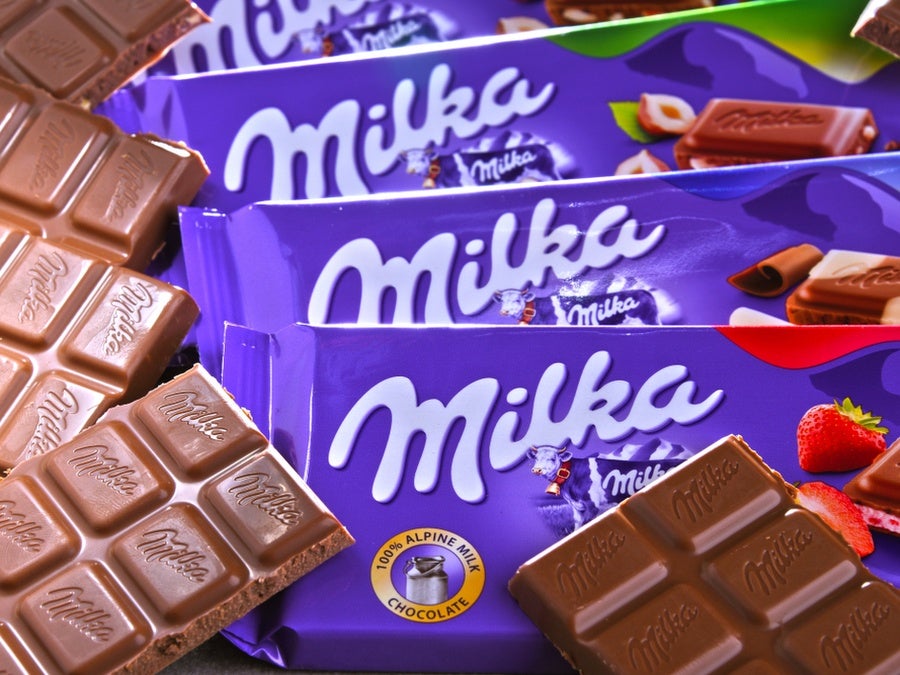
Mondelez International is further scaling down operations in Russia as the US-based snacks giant moves toward spinning off its business there before year-end.
While the food giant has faced criticism for its continued presence in Russia almost 16 months after Vladimir Putin invaded Ukraine, Mondelez was among an initial batch of companies to announce reactionary measures in March 2022.

Discover B2B Marketing That Performs
Combine business intelligence and editorial excellence to reach engaged professionals across 36 leading media platforms.
Around two weeks after Russia’s incursion, Mondelez said it would focus on selling only a “basic offering” of products. CEO Dirk Van de Put added at the time that the company would scale back “all non-essential activities” in Russia, abandon any new capital investment and suspend advertising spending.
Pressure has mounted, however, most recently as a boycott of Mondelez products in Norway was revealed in the past week. Norwegian Air said it had stopped selling the confectionery major’s products, while SJ Norge, the local unit of the Swedish train company, has halted orders.
Within days of that news, Mondelez issued a statement: “We’re continuing to reduce our activities and expect further volume and sales declines as we work to make our Russia operations self-sufficient. We plan to have the Russia business stand-alone with a self-sufficient supply chain before the end of the year.”
Mondelez’s Russian headquarters are in Moscow. The company has a factory producing chewing gum products in Veliky Novgorod, another in Pokrov making chocolate and a third in Sobinka for biscuits. And, as of 2022, Mondelez started importing Milka-branded products into Russia from Belgium.

US Tariffs are shifting - will you react or anticipate?
Don’t let policy changes catch you off guard. Stay proactive with real-time data and expert analysis.
By GlobalDataIn the statement yesterday (15 June), Mondelez said that “since the beginning of the war, we have condemned this brutal aggression against Ukraine”.
The company reiterated comments yesterday (15 June) made in March 2022 following the invasion on 24 February of that year, revealing the impact on volumes from the measures taken at the time.
“We have scaled down our activities, discontinuing new capital investments, new product launches and our advertising media spending in Russia. As a result of these actions, we are selling significantly less products as our sales are now declining. This year, our overall volumes have declined double digits and both our import volumes and market share have significantly decreased.”
Stand-alone or not, Mondelez will still have a presence in Russia. Ukraine’s National Agency for the Prevention of Corruption issued a list of companies earlier this year, deemed to be “sponsors of war”, which included Mondelez.
Asset risks
Mondelez defended its position yesterday in the context of its assets falling into the wrong hands as such.
“If we suspended our full operations, we would risk turning over our full operations to another party who could use the full proceeds for their own interests. It would mean cutting off part of the food supply for many families who have no say in the war.
“It would also create great uncertainty for our circa 3,000 colleagues and more than 10,000 farmers who depend on us.”
Mondelez added: “There are no easy decisions, but, like most other global food and beverage companies, we are continuing to provide food during these challenging times, focusing our operations in Russia on affordable, shelf-stable products that are daily staples for ordinary people.”
In its annual report covering the financial period to 31 December, Mondelez provided a detailed assessment of the situation in Russia, noting the country accounted for 4% of the snack maker’s $31.5bn in group net revenue, and Ukraine 0.3%. The business made a net profit of $2.7bn.
“International sanctions, export controls and other measures, including restrictions on the transfer of funds to and from Russia, that have been imposed on Russian entities, make it more difficult to operate in Russia, and failure to comply with applicable sanctions and measures could subject us to regulatory penalties and reputational risk.
“The war could also result in the temporary or permanent loss of assets or our ability to conduct business operations in Russia, and our Russian assets may be partially or fully impaired in future periods, or our business operations terminated, based on actions taken by Russia, other parties, or us.”
Mondelez also outlined the potential for malicious activities targeted at its Russian operations, and the prospect of an adverse reaction from shareholders.
“Our operations may be subject to increased disruptions to our information systems, including through network failures, malicious or disruptive software or cyberattacks by hackers, criminal groups or nation-state organisations. There is a possibility of loss of life and physical damage and destruction of property. We may not be able to operate in certain areas due to damage and safety concerns.”
The company added: “We might also face questions or negative scrutiny from stakeholders about our operations in Russia, despite our role as a food company and our public statements about Ukraine and Russia.”





